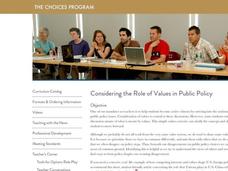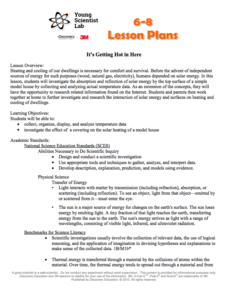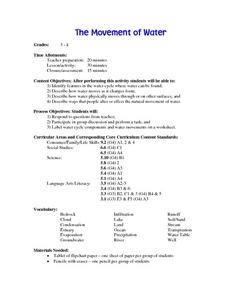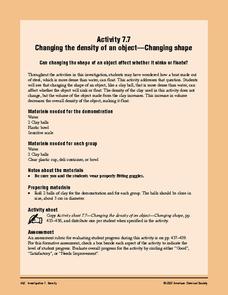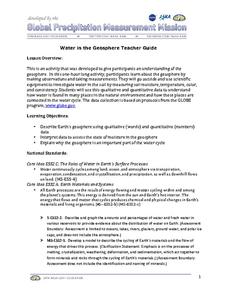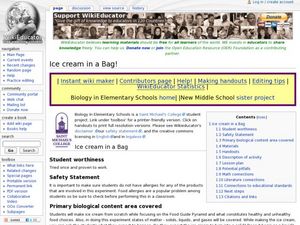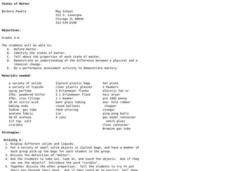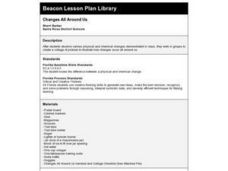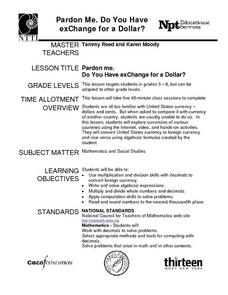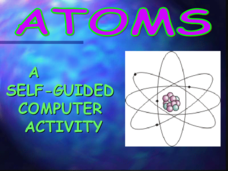NASA
Melting Ice: Designing an Experiment
Sometimes, despite the best laid plans, the unexpected will occur. Learners witness this firsthand as they carefully design an experiment to determine the time needed for ice to melt in salt water or pure water. They uncover facts not...
Brown University
Considering the Role of Values in Public Policy
Strong opinions come from deeply held values. Young citizens explore the values that are most important to them in a class discussion and activity. As they prioritize a list of values cards that include freedom, justice, and democracy,...
Discovery Education
It's Getting Hot in Here
Class members engage in a STEM experiment and investigate how materials affect heating in a house by creating models of houses and using different top surface materials. They record the temperature inside the models and consider what the...
Curated OER
The Movement of Water
Here is an excellent lesson plan on the water cycle and the states in which water exists. Learners identify the features of the water cycle, describe how water changes form, and look at ways that people affect the natural movement of...
American Chemical Society
Changing the Density of an Object - Changing Shape
Continuing with the concept of volume and its effect on density, learners now work with a piece of clay to see if they can get it to float in water. This is a memorable end to a seven-part investigation of density. Make sure to check out...
Curated OER
Water in the Geosphere
Through a PowerPoint presentation and the embedded animation and video, earth science enthusiasts find out about the moisture in the soil beneath our feet. In the animation, follow a water molecule on its path through the water cycle. As...
Curated OER
Changing States: Does it Matter
Students participate in experiments to visualize the differences between chemical and physical changes. They attempt to detect the five characteristics of a chemical change.
Curated OER
Cloud in a bag
Students relate the states of matter and clouds. In this environment lesson, students create a chart of information they know about clouds. Students put an ice cube in a bag and tape to a window. Students watch for condensation....
Curated OER
Ice Cream in a Bag
Learners observe phase change of matter by making ice cream in bags. In this states of matter lesson plan, students work in pairs to churn their own ice cream in plastic bags. They make predictions about how long it will take for the...
Curated OER
Discovering Physical Changes
Fourth graders determine what is meant by a physical change, and they demonstrate how they can make physical changes. They complete activities at stations that entail changes in color, size, texture, hardness, or state of matter. Using...
Chicago Botanic Garden
Climate and Forest Ecosystem Services
Forests, through sequestration, capture excess carbon dioxide in our atmosphere and store it, aiding in climate change. The third installment in a four-part series on how climate impacts forests explores carbon sequestration. Classes...
University of Colorado
Looking Inside Planets
All of the gas giant's atmospheres consist of hydrogen and helium, the same gases that make up all stars. The third in a series of 22, the activity challenges pupils to make scale models of the interiors of planets in order to...
National Institute of Open Schooling
Chemical Equilibrium
Le Chatelier's interest in thermodynamics and building materials such as cement and plaster led to the Le Chatelier Principle in 1884. Activity 13 in a series of 36 extensively explores chemical equilibrium. Learners read about...
Curated OER
The Nature of Chemical Change: Acting Out an Example
Students identify the signs that a chemical reaction took place. In this chemistry lesson, students role play the movement of different molecules of matter. They classify matter according to their properties.
Curated OER
States of Matter
Student explore states of matter. In this science lesson plan, students define matter, identify the states of matter, tell about the properties of each state of matter, and demonstrate an understanding of the difference between a...
Curated OER
States of Matter
Students examine the properties of solids, liquids, and gasses. In this states of matter lesson plan, the teacher guides students through a series of experiments to illustrate each state of matter and how matter changes from one state...
Curated OER
Changes All Around Us
Sixth graders, in groups, observe the difference between physical and chemical changes and create a collage of pictures to show the difference.
Curated OER
Learning About Matter And Energy
Students learn about matter and energy. In this science lesson plan, students gain an understanding of the properties of matter and energy as they discover that some things float, some things dissolve in water and discuss that energy can...
Curated OER
States of Matter
Learners discover states of matter. In this science lesson plan, students define matter, identify states of matter, explain properties of matter, and demonstrate the various uses of the states of matter.
Curated OER
What's the Matter?
Learners explore matter. In this matter and technology instructional activity, students locate examples of solids, liquids, and gases inside and outside the classroom, and record their findings in a graphic organizer. Learners listen...
Science Matters
Thermal Energy Flow in Materials
The sun sends the earth 35,000 times the amount of energy required by all of us on the entire planet, every day. The fourth lesson in the 10-part series looks at how light energy from the sun transfers into thermal energy. Scholars build...
Curated OER
Pardon Me. Do You Have Change For a Dollar?
Upper elementary and middle school learners explore currencies from a variety of countries. They use the Internet, video, and engage in hands-on activities. They practice converting U.S. currency to foreign currency and vice versa. This...
Curated OER
Nothing New? A Physical Change
Fifth graders discuss the differences between chemical and physical changes. In groups, they complete experiments and discover how a physical chnage can be reversed. To end the lesson, they review the steps of the water cycle and...
Curated OER
Atoms : A Self Guided Computer Activity
"Self-guided Computer Activity" simply means that young chemists read through the slides and take notes about atoms along the way. There is an abundance of text on each slide, making this a comprehensive introduction to atomic structure....



